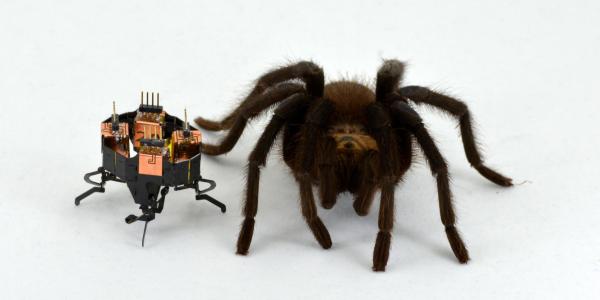Passersby walk in front of the JILA tower on the CU Boulder campus. (Credit: Patrick Campbell/CU Boulder)
Today, the U.S. National Science Foundation announced $25 million for a pioneering physics center on the CU Boulder campus—potentially paving the way for new discoveries around everything from the behavior of the humble electron to complex molecules.
For nearly two decades, the JILA Physics Frontiers Center at CU Boulder has explored the physics of the cosmos at its smallest scales. Researchers at the center have chilled clouds of atoms and molecules down to just millionths of a degree above absolute zero (roughly minus-460 degrees Fahrenheit). They’ve used X-ray lasers to record the heat flowing in real-time through nanodevices thinner than the width of a human hair. More recently, they discovered that the electron may be shaped more like a sphere than an egg.
The new grant will fund the center for six more years and seeks to spur collaborations among a wide range of scientists. The effort is led by JILA, a joint research institute of CU Boulder and the National Institute of Standards and Technology (NIST).
“The goal is to allow our investigators to take on more challenging projects and to work with scientists with different areas of expertise,” said Ana Maria Rey, co-director of the center and a fellow of NIST and JILA.
The JILA Physics Frontiers Center, founded in 2006, is one of 11 similar research enterprises currently funded by the NSF. These enterprises are “designed to foster major breakthroughs at the intellectual frontiers of physics.” The JILA team in particular strives to harness the strange and often unpredictable properties of quantum physics, or the physics of very, very small things.
The center also shares the wonders of this weird world with K-12 students across Colorado and beyond through a suite of education and outreach activities.
“Research teams at NSF Physics Frontiers Centers have made breakthrough after breakthrough, such as creating remarkable new states of matter and revealing the first evidence for the gravitational wave background of the universe,” said NSF Director Sethuraman Panchanathan.
“While different in their respective areas of focus, NSF's newly funded centers are all bold team efforts to punch through to exciting new vistas of scientific exploration. Achieving transformative opportunities requires us to reach those vistas through new technologies and other advances and have a look around.”
Andreas Becker, a JILA fellow who directs the center alongside Rey, said the team’s watchword is “collaboration.”
“We’re pushing the frontier in scientific questions that a single investigator cannot solve alone,” said Becker, also a distinguished professor of physics at CU Boulder.

Andreas Becker
Eye on the future
The list of those questions is long.
Rey explained that about 20 investigators are currently affiliated with the JILA Physics Frontiers Center, hailing from a wide range of physics fields. They include one Nobel Laureate, two Breakthrough Prize winners and two recipients of the MacArthur “genius grant.”
Together, these scientists work toward a common goal: understanding what researchers call “many-body systems.” In other words, how can the basic ingredients of the universe, like particles or atoms, come together to create states of matter with incredibly complex behaviors.
“We’re trying to learn how to harness the complexity of these many-body systems,” Rey said. “That can be very powerful because it gives rise not only to our understanding of the universe and how it works but can also lead to new technological applications.”
Since 2006, center researchers have helped to design “quantum” sensors that search for elusive dark matter—the mysterious substance that makes up most of the mass of the universe and holds together galaxies like the Milky Way. Physicists Margaret Murnane and Henry Kapteyn have developed lasers that can fit on top of a table and shoot out pulses of X-ray light at speeds of a billionth of a billionth of a second. Other researchers are laying the groundwork for quantum computers, or devices that tap into the properties of quantum physics and could one day outpace traditional computers.
In addition to the Physics Frontiers Center, JILA hosts two other major NSF centers: the STROBE Science & Technology Center and Quantum Systems through Entangled Science and Engineering (Q-SEnSE).
“This NSF investment will fuel the continuation of breakthrough discoveries at the leading edge of quantum science and technology,” said Massimo Ruzzene, CU Boulder vice chancellor for research and innovation and dean of the institutes.
“Thanks to this center, along with other leading research centers clustered on and around the CU Boulder campus, Colorado’s Front Range is earning a reputation as one of the leading quantum hubs in the nation—for students, researchers, companies and the next-generation quantum workforce.”
Becker and Rey also hope the center will inspire a new generation of scientists to explore questions that might seem impossible today.
The center supports Partnerships for Informal Science Education in the Community (PISEC) at CU Boulder. This semester-long, after-school program introduces Colorado students from backgrounds underrepresented in the sciences to physics. K-12 students tour labs at JILA and may even lead their own research projects, presenting findings at an annual poster session.
The center also provides cross-mentoring so that graduate students can meet each other and talk about their research so they feel like a real community.








